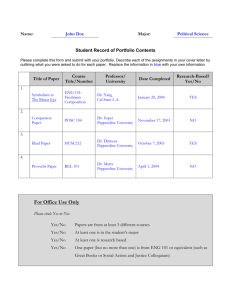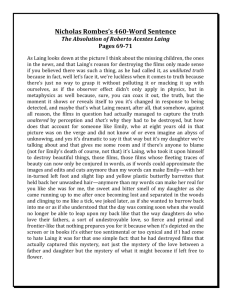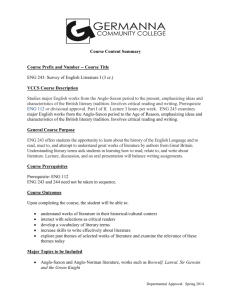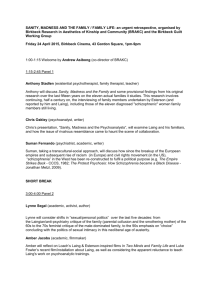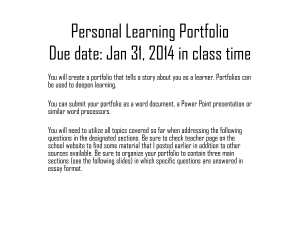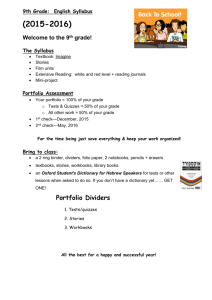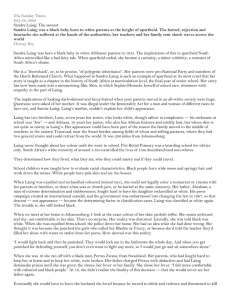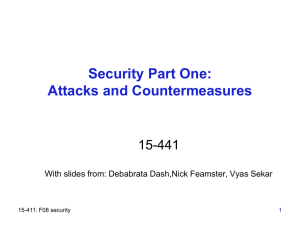Syllabus
advertisement
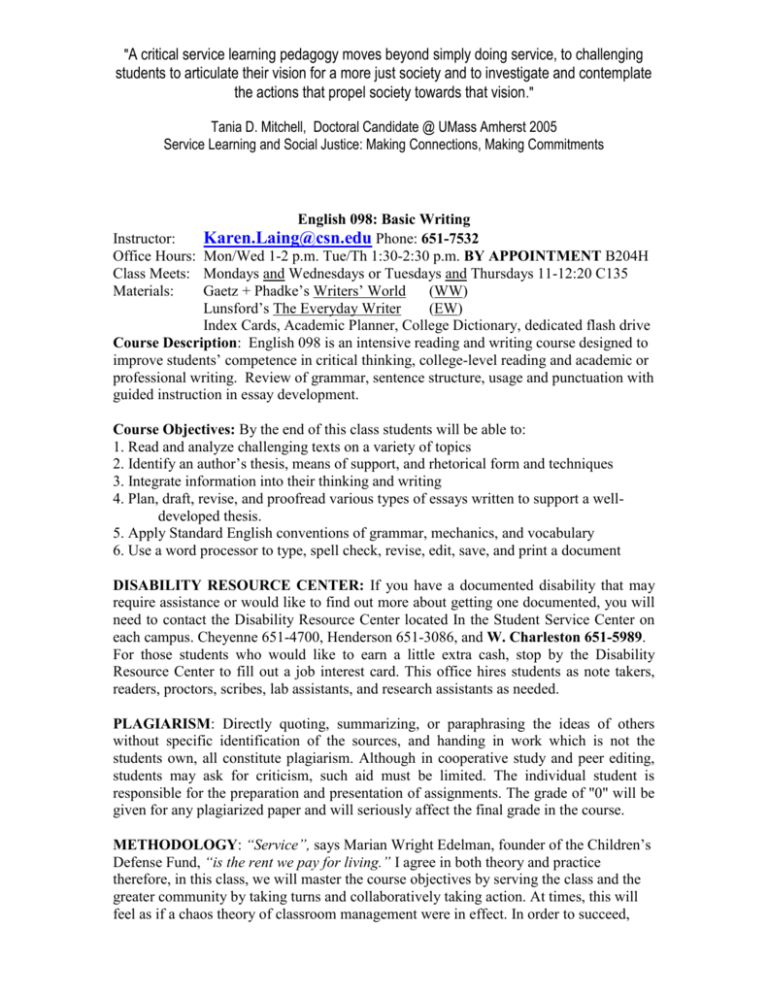
"A critical service learning pedagogy moves beyond simply doing service, to challenging students to articulate their vision for a more just society and to investigate and contemplate the actions that propel society towards that vision." Tania D. Mitchell, Doctoral Candidate @ UMass Amherst 2005 Service Learning and Social Justice: Making Connections, Making Commitments English 098: Basic Writing Instructor: Karen.Laing@csn.edu Phone: 651-7532 Office Hours: Mon/Wed 1-2 p.m. Tue/Th 1:30-2:30 p.m. BY APPOINTMENT B204H Class Meets: Mondays and Wednesdays or Tuesdays and Thursdays 11-12:20 C135 Materials: Gaetz + Phadke’s Writers’ World (WW) Lunsford’s The Everyday Writer (EW) Index Cards, Academic Planner, College Dictionary, dedicated flash drive Course Description: English 098 is an intensive reading and writing course designed to improve students’ competence in critical thinking, college-level reading and academic or professional writing. Review of grammar, sentence structure, usage and punctuation with guided instruction in essay development. Course Objectives: By the end of this class students will be able to: 1. Read and analyze challenging texts on a variety of topics 2. Identify an author’s thesis, means of support, and rhetorical form and techniques 3. Integrate information into their thinking and writing 4. Plan, draft, revise, and proofread various types of essays written to support a welldeveloped thesis. 5. Apply Standard English conventions of grammar, mechanics, and vocabulary 6. Use a word processor to type, spell check, revise, edit, save, and print a document DISABILITY RESOURCE CENTER: If you have a documented disability that may require assistance or would like to find out more about getting one documented, you will need to contact the Disability Resource Center located In the Student Service Center on each campus. Cheyenne 651-4700, Henderson 651-3086, and W. Charleston 651-5989. For those students who would like to earn a little extra cash, stop by the Disability Resource Center to fill out a job interest card. This office hires students as note takers, readers, proctors, scribes, lab assistants, and research assistants as needed. PLAGIARISM: Directly quoting, summarizing, or paraphrasing the ideas of others without specific identification of the sources, and handing in work which is not the students own, all constitute plagiarism. Although in cooperative study and peer editing, students may ask for criticism, such aid must be limited. The individual student is responsible for the preparation and presentation of assignments. The grade of "0" will be given for any plagiarized paper and will seriously affect the final grade in the course. METHODOLOGY: “Service”, says Marian Wright Edelman, founder of the Children’s Defense Fund, “is the rent we pay for living.” I agree in both theory and practice therefore, in this class, we will master the course objectives by serving the class and the greater community by taking turns and collaboratively taking action. At times, this will feel as if a chaos theory of classroom management were in effect. In order to succeed, you will need to find your mind and insert it into the Matrix, wherever and as often as possible, being mindful of one another’s strengths and struggles. To cultivate the ability to pay increasing attention to such details and act on the resulting intentions, we will practice what Stephen Covey calls The Seven Habits of Highly Effective People. For additional information on how to succeed in this class, make a plan then, login to WebCT or schedule an office visit to read Legacies of what previous students have figured out. Each week you are asked to submit a Critical Incident Questionnaire (CIQ). This is one way you share in creating the conditions that best support learning. Prepare to challenge your thinking & writing. Interdependent thinkers welcome and groomed! THIS IS A COURSE ABOUT WRITING BY: Becoming a self-directed learner Practicing accountability & civic engagement Developing confidence and competence on and off the page Teaching & Learning Decoding and Encoding Discovery and Intention Using the writing processes of invention, discussion, drafting, editing, collaborating, revising Practicing the 7 Habits to be a better thinker, writer, citizen, humane being COURSE REQUIREMENTS Evaluation: Only timely submissions will be graded. Save BOTH print and electronic copies of each assignment for revision, portfolio and presentation purposes. 30 points: Attendance 30 points: Writing 50 points: Assessment 10 WW Chapter Exercises + one paragraph each on index cards 7 Free writing analyses (FWA) See sample for required format. FWA due by 7:00 a.m. each Monday in WebCT Dropbox 7 Critical Incident Questionnaires (CIQ) see sample Essays (4 total all grades include points for peer editing - 5 points per rhetorical pattern) *NOTE: only revised essays that are submitted with evidence of a writing process will earn credit toward your grade. Submit the Smarthinking markup, peer editing checklist and cover sheet listing types of revision with final drafts. 2 scheduled visits during Office hours (5pts/ea) 7 Quizzes with scores of >70, Syllabus Quiz, Midterm, Exit Exam 10 hours of Service, Team Teaching, 2 Process Papers Legacy & Portfolio (Draft due week 6, Final week 7) 10 pts/ea Portfolio also includes original & revised writing samples. Extra credit may be earned for a total of 10 points toward your final grade. You may attend any campus sponsored event and submit a 2-pp TDS paper the following class. Grading: Students must earn a C or better in Eng 098 to register for ENG 100/101. A = 90 – 100 B = 80-89 C = 70-79 D = 60-69 F = 59 and Below ENG 098 F08 K. Laing Page 2 of 10 The instructor reserves the right to adjust assignments and weights as needed. Every effort will be made to provide timely notification of such changes. Avoid 10 point errors (a.k.a. Ms. Laing’s Pet Peeves) by eliminating spelling & usage of errors computers won’t catch! These include, but are not limited to words like: Know/no their / there / they’re too/to/two its/it’s could/should/would have affect/effect then/than PARTICIPATION AND ATTENDANCE Always attend. Every class meeting is valuable. Attendance and active participation are required. If you know that you will miss class regularly, take a different section of English 098. Do not miss class. Late assignments / absences will be excused only when absence is unanticipated (extreme illness, funeral, unavoidable lack of transportation, medical emergency) and only when proper documentation is provided (doctor’s note, funeral home note, car towing/repair receipt, hospital release form). Note: If you are absent from class, it is your responsibility to obtain copies of handouts, lecture notes, announcements, etc. from a classmate. A voluntary contact list will be provided and the student serving as Oracle for the week will post notes on WebCT. Every late arrival to or early departure from class of 10 minutes or more will deduct the same number of points from students’ quiz grades. WITHDRAWAL POLICY Notice for Students Who Stop Attending Classes: STUDENTS must initiate withdrawal from a course(s) by completing the appropriate form through the STUDENT SERVICES OFFICE. Withdrawal is a student option. STUDENTS who have not withdrawn after repeated /extended absence or do not attend class and submit assignments conscientiously will earn the grade of F. The last date of attendance will be reported to the Registrar’s Office. ASSIGNMENTS Reading Journal & Free Writing Analysis In your reading journal you will record an entry for each of the reading assignments and track your progress with service learning. The journal is due at the end of the term as one artifact of your portfolio however, each week, a one-page Free Writing Analysis (FWA) will be submitted at the beginning of the first class for the week. See attached sample. When you submit your completed journal as part of your portfolio, you should have page numbers, a title and date for each entry, a table of contents, a word count for each 10minute writing, and an evaluative conclusion. A summary of this conclusion will serve as one paragraph in your Legacy and includes reflection on your semester’s learning captured, in part, on the weekly Critical Incident Questionnaires (CIQ*). The final journal should have 48 complete, typed or handwritten entries and be organized by the week and stapled to one of each of the 7 FWAs. Beyond these guidelines, how you organize and present your portfolio will be your decision; a matter of style, temperament, personal preference and purpose. See attached Legacy Rubric. Students are expected to make an entry into their journal in advance of each class meeting about the assigned reading(s) and submit the final exercise of each chapter, in paragraph form, on an index card to the Oracle at the beginning of each class. Chapter exercises will be collected. ENG 098 F08 K. Laing Page 3 of 10 WRITING: Literacy Narrative / Book Review + Ad / Team & SL Process Papers Tests & Quizzes Students will take one midterm and several quizzes: one covering the syllabus with the remainder covering the assigned readings, aspects of the service learning project and grammar. Quizzes are designed to take no more than 30 minutes of a class period to complete. Additional quizzes will be assigned related to necessary corrections in individual students’ writing and are to be completed and submitted with revised essays. Quizzes are available on demand at Exercise Central, the companion website to our class handbook: The Everyday Writer. Once an assignment has been returned, students have one week from the date of return to satisfactorily complete a quiz (= grade of 70+) on Exercise Central related to each area where points were deducted. Editing symbols are listed on the inside rear cover of The Writer’s World and are to be used when peer editing classmate’ work. The midterm is a reflective essay detailing students’ progress to date. Beyond Membership: Service Learning At its most basic level, service learning is a teaching methodology that actively engages students in the learning process and bridges the gap between theory and practice while connecting students with the community (and vice versa) to accomplish course related and meaningful goals. Activities will be related to any of the career options the student is considering. A proposal including objectives, rationale and timeline for completion will be submitted for approval. In addition, essays may relate to the student’s selected culture. TEAM TEACHING: In addition to community service related to the students proposed career field, student teams will prepare and deliver a one-hour lesson, and individual reflective process paper submitted the following class, related to eliminating their team’s chosen form of oppression and: one course objective from the syllabus one rhetorical pattern from The Writer’s World one method (per team member) for avoiding Lunsford’s 20 Most Common Errors one of The Seven Habits of Highly Effective People as it relates to the elimination of your team’s ‘ism’. Emancipate yourselves from mental slavery. None but ourselves can free our minds. Bob Marley Coming together is a beginning. Keeping together is progress. Working together is success. Henry Ford Be advised that for every three credit hours and in-class, contact time, students can expect nine hours of homework per week. Be realistic and plan accordingly. If you have additional employment or domestic responsibilities prioritize, communicate and organize. ENG 098 F08 K. Laing Page 4 of 10 WORKING AGREEMENTS MAKE THINGS GO WELL Because this course must build upon or replace habits formed in 12 or more years of formal and informal education in eight weeks’ time, and because writing involves testing or creating new habits of thinking, being and doing, students will have to take ownership of and assume leadership for their learning. Therefore, in each class meeting we will: read, write, dyad, revise, discuss, plan and play some. Team or group activities will identify a recorder and a recorder for taking and presenting notes from each working session and assuring that the Oracle has them for posting & inclusion in the class binder. Roles alternate weekly so everyone serves in each role at least once. In addition, each week someone will serve as: Discussant: Selects in-class writing & dyad (paired discussion) topics related to reading / rhetorical strategy for the week. Moderates discussion. See Brookfield’s Conversational Roles attached. Columbo: Observes class to identify muddy moments and asks clarifying questions. Helps distribute and collect info. Oracle: Takes notes and posts to related section of WebCT discussion board; prints a copy and places it in class binder; records week’s attendance / paragraphs / CIQs. M/r/s. Rogers: Serves as timekeeper to keep class on schedule. Looks for ‘aha!’ moments to celebrate and includes these at the end of class with a summary of what worked well / what could be done differently, aloud and in class binder. (Of course, students not in these roles for the week may offer suggestions.) I strongly urge students to drop in during Reading/Office hours the week before they must fulfill one of these roles to brainstorm ideas for their service. PROPOSED COMMUNITY GUIDELINES (in addition to practice of 7 Habits) I will practice humility, accountability, respect of self & others by: acting from the perspective of my inherent intelligence encouraging others to participate thoughtfully by example welcoming making mistakes as part of the learning process not speaking twice before everyone has had the chance to speak once inviting others to thoughtfully correct and / or appreciate my contributions to class and doing likewise IN ADDITION:(to get/give the most in this class I need… ENG 098 F08 K. Laing Page 5 of 10 Stephen Covey’s Seven Habits of Highly Effective People 1st Habit - Be Pro-active. Take responsibility for everything in life. When you're reactive, you blame other people and circumstances for your problems. 2nd Habit - Begin with the End In Mind. Visualize long-term goals. 3rd Habit - Put First Things First. Prioritize and delegate goal-related tasks. 4th Habit - Think Win/Win Seek mutually beneficial solutions. 5th Habit - Seek First to Understand, Then to be Understood. Listen 1st. 6th Habit - Synergize Build on divergent strengths. Collaborate creatively. “The whole is greater than the sum of its parts.” 7th Habit - Sharpen the saw Practice balanced self-renewal by engaging in carefully selected recreational activities. SAMPLE FORMAT for standard two-page (2pp), typed, double spaced (TDS) essay Student Name ENG 098 Section # Type & Version of assignment Date TITLE GOES HERE First line of paragraph 1 begins here and uses text wrap (not return) to get to the next line of text. Be sure to use Microsoft Word defaults and set double spacing using format menu. Always correct date and version of assignment in header and staple all pages in the upper left hand corner before submitting your work, unless asked to submit via Assignment Dropbox in WebCT. Avoid using first person and include evidence of a writing process which may include but is not limited to: previous drafts, Smarthinking mark-up, peer editing checklist, corrective quizzes and grading rubric. Be sure to use correct grammar, complete sentences and coherent paragraphs. ENG 098 F08 K. Laing Page 6 of 10 REQUIRED FORMAT FOR FREE WRITING ANALYSIS STUDENT NAME ENG 098 SECTION# FWA Week # & date Date Time 09/10 6:00am First Sentence I own my values and beliefs… Chapter Description # of words 204 09/11 2:00am In order to relax from a hard day at… Process 231 09/12 11:45pm It is always better to tell the truth… Argument 253 00/13 6:45pm I have learned a valuable lesson… Description 236 09/14 10:12pm Some of the reason we .. Cause and Effect 274 09/15 6pm There is a huge difference between.. Comparison& Contrast 310 ANALYSIS What did I discover about my writing or myself? What I discovered about my writing is that I wrote in a variety of rhetorical patterns this week. I found each pattern to be interesting for its own reasons. I also want to increase my word count. What do I intend to do with what I noticed? I intend to focus on writing using patterns such as argument, description and process where I didn’t write as much as I did when using Comparison Contrast as my pattern. What resources do I have? I use The Writer’s World more than ever because it gives me helpful tips depending on the rhetorical pattern that I choose. I have also found the college’s online databases useful when looking for additional reading material if I’ve completed my homework and have 10 or more minutes left over. This also helps me practice the course objective about identifying an author’s thesis. What resources do I need? I don’t really think I need any resources I just need a greater vocabulary. I need to expand the amount that I already have. By adding more resources it will just improve my free writing assignments all together, or I’ll have to learn to improvise and continue to make the best out of the vocabulary I already have. What did I do well? I think I was able to stay on track with what patterns I picked . *Answer each question in the analysis section of the FWA using PREPed paragraphs. (PREP = Point / Reason / Example / Point) ENG 098 F08 K. Laing Page 7 of 10 DATE: CLASS: 098 SECTION: Stephen Brookfield’s Classroom Critical Incident Questionnaire Please take about five minutes to respond to each of the questions below about this week's class(es). Don't put your name on the form. Your responses are anonymous. When you have finished writing, put one copy of the form on the table by the door and keep the other copy for yourself. At the start of next week's class, I will be sharing the responses with the group. Thanks for taking the time to do this. What you write will help me make the class more responsive to your concerns. (KL’s students please save a copy for your portfolios) 1 At what moment in the class this week did you feel most engaged with what was happening? 2 At what moment in the class this week did you feel most disconnected from what was happening? 3 What action that anyone (teacher or student) took in class this week did you find most affirming and helpful? 4 What action that anyone (teacher or student) took in class this week did you find most puzzling or confusing? 5 What about the class this week surprised you the most? (This could be something about your own reactions to what went on, or something that someone did, or anything else that occurs to you.) ENG 098 F08 K. Laing Page 8 of 10 Stephen Brookfield’s Conversational Roles Problem, Dilemma, or Theme Poser This participant has the task of introducing the topic of conversation. She draws on her own ideas and experiences as a way of helping others into conversation about the theme. Reflective Analyst This member keeps a record of the conversation's development. Every 20 minutes or so, she gives a summary that focuses on shared concerns, issues skirted, and emerging common themes. Scrounger The scrounger listens for helpful resources, suggestions, and tips that participants have voiced as they discuss how to work through a problem or situation. She keeps a record of these ideas that is read out before the session ends. Devil's Advocate This person listens carefully for any emerging consensus. When she hears this she formulates and expresses a contrary view. This keeps group-think in check and helps participants explore a range of alternative interpretations. Detective The detective listens carefully for unacknowledged, unchecked and unchallenged biases that seem to be emerging in the conversation. As she hears these she brings them to the group's attention. She assumes particular responsibility for alerting group members to concerns of race, class and gender. She listens for cultural blindness, gender insensitivity, and comments that ignore variables of power and class. Theme Spotter This participant identifies themes that arise during the discussion that are left unexplored and that might form a focus for the next session. Umpire This person listens for judgmental comments that sound offensive, insulting and demeaning, and that contradict ground rules for discussion generated by group members. Textual Focuser Whenever assertions are made that seem unconnected to the text being discussed, this person asks the speaker to let the group know where in the text the point is made. Connector This person does her best to show how participants’ contributions are linked or connected to each other. Make a comment that underscores the link between two people's contributions - make this link explicit in your comment Summarizer This person has the responsibility to make summary observations that take into account several people's contributions & that touches on a recurring theme in the discussion. Appreciator This person makes comment indicating how she found another person's ideas interesting or useful. She is specific as to why this is the case. She does her best to find a way to express appreciation for the enlightenment she has gained from the discussion. She tries to be specific about what it was that helped her understand something better. ENG 098 F08 K. Laing Page 9 of 10 LEGACY RUBRIC _______________________ ‘s Portfolio: Your name _______________________ Peer edited by Your Legacy is a letter that introduces your portfolio. It is two pages, TDS. In it you will offer examples, advice and encouragement to an incoming student and discuss the representative course materials (artifacts) you have assembled in your portfolio. Your Legacy: ____/20 pts 1) ____/20 pts 2) ____/20 pts 3) ____/20 pts 4) ____/20 pts 5) Describes your work a. What artifacts are in your portfolio? b. Why/how did you select these items? c. What useful information do they provide for future students? Analyzes the Service Learning (SL) experience: d. What do the artifacts indicate about your understanding of SL? e. How did your service contribute to a more just society? f. How did your service experience impact you? g. If you knew then what you know now what would be different? Uses examples of your work to illustrate improved writing skills: h. What do comparison and contrast of early and more recent items in your reading journal reveal about the: i. Concise use of language? j. Coherence of paragraphs? k. Mastery of standard English and personal writing challenges? l. Additional personal struggles and successes? Reflects & discusses your mastery of two course objectives: m. Read and analyze challenging texts on a variety of topics n. Identify an author's thesis, means of support, and rhetorical form and techniques o. Integrate information into your thinking and writing p. Plan, draft, revise, and proofread various types of essays written to support a well-developed thesis q. Apply Standard English conventions of grammar, mechanics, and vocabulary r. Use a word processor to type, spell check, revise, edit, save, and print a document Advises, engages and encourages an incoming ENG. 098 student: s. What challenges might s/he expect? t. What resources are available to him/her? u. Which resources did you find most useful? v. Which resources did you find least useful? w-z Your choice. In this essay, though required, you cannot earn points for correct format, use of grammar, punctuation, capitalization, and conventions. Such errors can only subtract points from your final score and therefore must be assiduously avoided. ENG 098 F08 K. Laing Page 10 of 10
